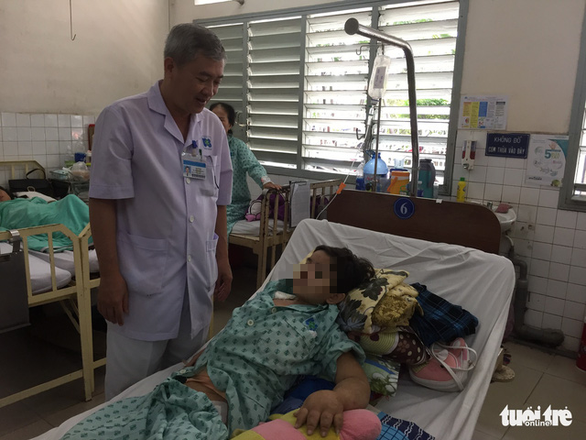
Successful Removal of Massive Intra-Abdominal Hemorrhage at Lilavati HospitalSuccessful Removal of Massive Intra-Abdominal Hemorrhage at Lilavati Hospital A team of medical professionals at Lilavati Hospital in Mumbai successfully removed over two liters of blood from a woman’s abdomen, saving her life despite facing significant challenges. The patient, Mrs. Rabia Khan (name changed), suffered from massive intra-abdominal hemorrhage due to a neglected anticoagulant medication regimen. Upon arrival at the hospital, she presented with symptoms of respiratory distress, dizziness, and abdominal pain. Her blood work revealed a dangerously low Hb of 5 g/dl and an INR of 10, indicating severe coagulation problems. Dr. Rekha Agrawal, Senior Honorary Consultant in Obstetrics and Gynaecology, led the team that managed the patient’s care. The aim was to normalize her INR to perform a laparoscopic surgery to stop the bleeding. However, it was a race against time as the patient’s hemoglobin dropped rapidly. Through rapid interventions, the team managed to stabilize the patient’s blood counts to a safe range for surgery. Dr. Agrawal then performed laparoscopic surgery, which revealed a hemorrhagic ovarian cyst as the source of the bleeding. The cyst was removed, along with the affected fallopian tube, and 2.2 liters of free blood were successfully drained from the abdomen. Over the next 48 hours, the patient made a full recovery and her clotting profile returned to normal. She was discharged with IV Ferric Carboxymaltose to replenish her iron stores and was advised to closely monitor her INR with her cardiologist. Dr. Niraj Uttamani, Chief Operating Officer of Lilavati Hospital, praised the team’s quick thinking and surgical expertise, highlighting the hospital’s commitment to setting new standards in patient care and treatment outcomes. Mrs. Khan expressed her gratitude to the medical team for their unwavering efforts and for saving her life.
A team led by Dr. Rekha Agrawal, Senior Honorary Consultant in Obstetrics And Gynaecology, Lilavati Hospital, Bandra, Mumbai, successfully removed more than two litres of blood from the abdomen of a woman, despite great odds, and saved her life. The patient had suffered from massive intra-abdominal haemorrhage. This patient had undergone aortic valve replacement surgery 4 years ago and was advised on an anticoagulant drug regimen. However, the patient has neglected to monitor her INR (international normalised ratio) regularly. The normal INR is 1.1. People with heart valve replacement who are on warfarin should maintain an INR between 2-3.
Mrs. Rabia Khan (name changed)*, a 37-year-old housewife, presented to the emergency department with respiratory distress, dizziness and abdominal pain. On arrival, her pulse was 130 bpm. Her blood pressure was 80/60 mm. Abdominal examination revealed massive anterior abdominal wall contusions, suggesting intra-abdominal haemorrhage. All signs of free fluid in the abdomen were also positive. Her abdominal USG revealed more than 2 litres of free fluid in her abdomen and a right-sided ovarian mass measuring almost 5 cm by 6 cm. Her blood work revealed a Hb of 5 g/dl. Her INR was 10 and PTT was unrecordable. All coagulation profiles were disturbed. The patient was essentially in DIC and in haemorrhagic shock.
Also read: Mumbai: 3,000 beds in ‘these’ hospitals reserved for patients with rain-related illnesses
Dr Rekha Agrawal, Senior Honorary Consultant in Obstetrics And Gynaecology, Lilavati Hospital, Bandra, Mumbai said, “The aim was to normalize her INR so that we could perform a laparoscopic surgery and stop the bleeding. However, it was a race against time. In the next 1/2 hour, the patient’s haemoglobin dropped to 4.5. She was given 8-10 fresh frozen plasma, packed blood cells, platelet infusions and Nova 7 for six hours. This brought her blood counts to a safe range for surgery. Under the expert anaesthesia team at Lilavati, Dr Rekha performed laparoscopic surgery (keyhole surgery), which minimizes the operative time and morbidity associated with open surgery. During the laparoscopic surgery, it was discovered that she was bleeding from a haemorrhagic ovarian cyst, which had caused 2 litres of blood to accumulate in her abdomen.
The bleeding ovary and fallopian tube were removed. The abdomen was drained of all free blood. 2.2 liters of blood were successfully removed, stopping the bleeding. Her clotting profile returned to normal. Over the next 48 hours she made a full recovery and is ready for discharge. At discharge the patient was advised to monitor her INR and to follow her cardiologist closely. Her Hb at discharge was 8 gm/dl and she has been given IV Ferric Carboxymaltose 1000 mg to replenish her iron stores.”
“Their quick thinking and mastery of surgical techniques played a crucial role in ensuring the patient’s survival. The complex nature of intra-abdominal haemorrhage requires swift action and exceptional skills and abundant resources all of which were present at the hospital. With every successful outcome, the hospital strives to set new standards in patient care and treatment outcomes,” said Dr Niraj Uttamani, Chief Operating Officer, Lilavati Hospital & Research Centre, Bandra.
“When I heard the words intra-abdominal bleeding, I panicked and thought about the consequences. However, the doctors at Lilavati Hospital worked tirelessly to stabilise me, fighting against all odds. I am filled with gratitude to the doctors who saved my life,” concluded patient Ms Rabia Khan (name changed)*.